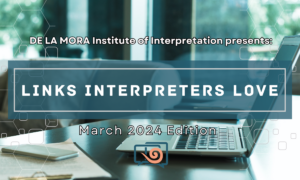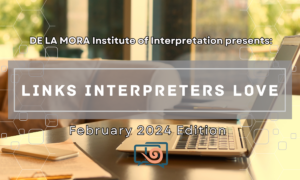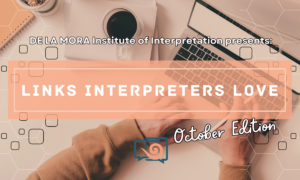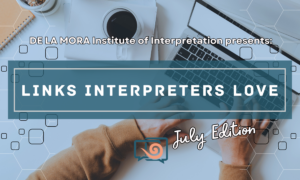
Finding the Parallels: A Weekend to Remember!
Last weekend, DE LA MORA Interpreter Training teamed up with various members of the interpreting community to host a summit with the theme of “Finding the Parallels.” We examined the crossroads where legal and medical interpreting intersect, and learned from doctors, interpreters, and law enforcement officers who all have experience in the field.
Giovanna Lester and Patricia Alonzo opened the weekend with presentations from the National Association of Judiciary Interpreters and Translators (NAJIT) and the International Medical Interpreters Association (IMIA) respectively.
They were followed by a panel discussion on finding the parallels between the interpreter codes of ethics in…
Lessons From the Field: It’s All Just Interpreting… Or is it?
By Athena Matilsky
When I enter a court-room, I suddenly transform into “Madame Interpreter.” I must admit, the first time a judge addressed me in such a fashion I felt a thrill. I still find it quite soothing to the ears; it’s one of the bonuses of working in court.

However, when I first started interpreting, the courthouse intimidated me. I found it easier to work in clinics and hospitals, where things didn’t feel so formal and rigid. I felt like I was helping to facilitate peoples’ well-being instead of their punishments.
In a medical setting, I’m definitely not “Madame…
LIL: Double Meanings in Interpretation
One of the most important principles of the interpretation field is being able to produce a complete and accurate rendering of the source material. This is generally understood to mean that we shouldn’t add, omit, or alter anything in the original message. However, this mantra can be extended even further by adding that our renditions should be understood in exactly the same way as the original message. I think Robert Plant of Led Zeppelin said it best: “. . .[we] want to be sure / ‘cause you know…
LIL: Use it or Lose it: Maintaining a Language
Congratulations! You’re bilingual! Maybe you’ve spoken two languages all your life, or maybe you picked one up in school. Or maybe you’re one of those rare creatures we call a polyglot: a person who knows and can use multiple languages (usually more than two).
No matter how you acquired your language(s), you now face a decision. Do you want to keep this language, or forget it?
If you do end up forgetting a language that you wanted to keep, you’ve essentially lost everything you invested into learning that language: tuition, time, relationships, effort, etc.
Even your native language can suffer…
Lessons from the Field – Check Interpreting: A Survival Kit
By Katty Kauffman
A few days ago a former student reached out for guidance. She had been hired to interpret at a trial, but when she arrived she discovered that she was in fact there to serve as a check interpreter. Her question was simple: what should I do?
Unfortunately, the answer is not that straightforward. While there is plenty of guidance out there for court interpreters in general, when it comes to check interpreting, there is precious little to go by.
But first, what is “check interpreting?” When might we be asked to serve as a monitor or “check”…














